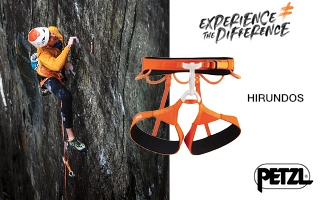Nonaka and Schalck take golds in WC Boulder at Seoul
- Wednesday 3rd May 2023
Miho Nonaka finishes back on top of the podium for first time in five years whilst Mejdi Schalck wins second gold of the season in back-to-back successes.
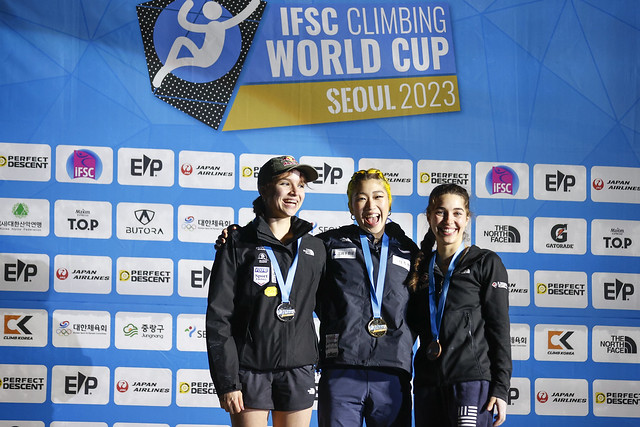
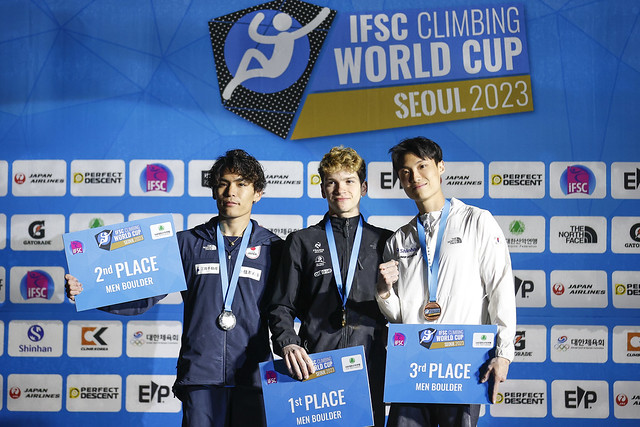
Following on from the amazing Speed competition – click here to record our report about the new records set – the Boulder event in Seoul was unfortunately impacted by heavy rainfall. After a delay the women’s qualification round was held but the men’s was postponed until the day after because of the time pressures following the rain. As a consequence, the finals for both women’s and men’s divisions were cancelled and the medals and rankings awarded for both from the athletes standings after the semi-final. That impacted both athletes and setters alike making the semi’s a “sudden death” round to end the competition!
Both the women’s and men’s qualification rounds were pretty high scoring rounds but in perhaps a sign that the setters had ramped the difficulty up a notch for Seoul, the drop-off down the rankings was progressive and marked.
Ayala Kerem (ISR) alone topped all five problems in the women’s division to finish in the lead after the qualifiers; last week’s silver medallist, Hannah Meul (GER), finished in joint third place whilst gold medallist Brooke Raboutou (USA), finished in joint 13th. Natalie Grossman (USA) and Miho Nonaka (JPN) both had better rounds in Seoul finishing in joint 7th and 9th respectively. Also representing GB Climbing in the finals was Erin McNeice; impressively she finished in joint 19th in her second ever WC Boulder event.
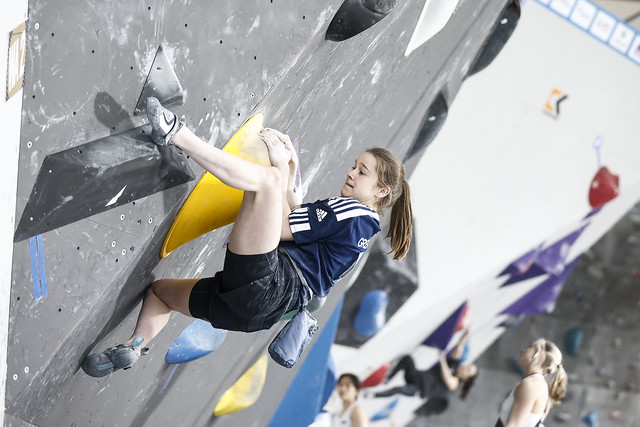
Mejdi Schalck (FRA) continued his good form to finish joint top of the men’s ranking after the qualifiers sharing the position with home athlete, Dohyn Lee (KOR); both finished with tops on four of the five blocs. Kokoro Fuiji (JPN) and Team GB climber Max Milne finished in joint 3rd also on four tops; Tomoa Narasaki (JPN) was close behind with the same number of tops albeit in more attempts. Impressively, fellow GB climber, Toby Roberts ended the qualifiers with three tops, sufficient for a joint 9th finish. The rest of the qualifiers going through to the men’s semis demonstrated just how stacked the field was; Alberto Gines Lopez (ESP), Nicolai Uznik (AUT), Yannick Flohe (GER), Nicolas Collin (BEL), Hannes Van Duysen (BEL), Seam Bailey (USA) and Simon Lorenza (BEL).
Because of the rescheduling, both semi-finals ran concurrently; the walls and the mats therefore unusually busy with eight climbers in action at the same time. Reports are that the problems set for the finals were used in the semi-finals and that the competitors had five minutes – including observation time – rather than the usual four minutes and an observation period. It all worked out in the end but the heavy rain and the rapidly rescheduled programme obviously created problems for the organising team as well as the competitors alike.
The women’s results and podiums positions were all super close; all three medallist got two tops but the additional zone which Miho Nonaka was able to get earned her the top spot and her first gold medal in five years. In this case her gold-tined hair proving very apt! Oriane Bertone kept her game together and was duly rewarded with a silver medal. Finally, Brook Raboutou, last week’s winner in Hachioji, got the final podium position and a bronze medal to go with it.
The men’s podium was also very tightly contested and, exactly like the women’s, two tops and three zones was enough for the win and a second gold in as many weeks for Mejdi Schalck. Joining Schalck on the podium were two long-established competitors; Tomoa Naraski and Jongwon Chon taking silver and bronze respectively. Aside from Schalck who is proving a very consistent performer this year, the rest of the men’s field appears to be very fluid. Under the circumstances it was interesting to see two older established climbers doing so well against the younger and up-and-coming stars. That will be cold comfort however for some of the other older/well-established climbers like Jakob Schubert and Jernej Kruder; once again both were denied the opportunity to progress into the semi’s and hence a chance for a podium position.
Having had three climbers through to the semi’s Team GB had a very good competition. Given how stacked the semi’s were can only be taken as a sign of how healthy our bouldering team is at the minute. In the end, Toby Roberts finished Seoul in 8th place whilst Max and Erin finished in 11th and 17th respectively. Toby Roberts’ 8th place finish is especially impressive as Seoul was only his second ever WC Boulder event in what is his first full season as a senior. Max Milne, who finished last year’s WC Boulder season in sixth place overall, will be happier with his higher finish this week as will Erin MacNeice given, like Toby, Seoul is her second ever WC Boulder event in her first year in the seniors.
The other Team GB climbers battled hard but were denied the opportunity to progress to semi’s; Hamish McArthur and Dayan Akhtar finished in joint 33rd and 35th whilst Jim Pope, last week’s highest finisher at Hachoiji, dropped back to 57th. Eugenie Lee and Jen Wood finished in joint 45th and 55th.
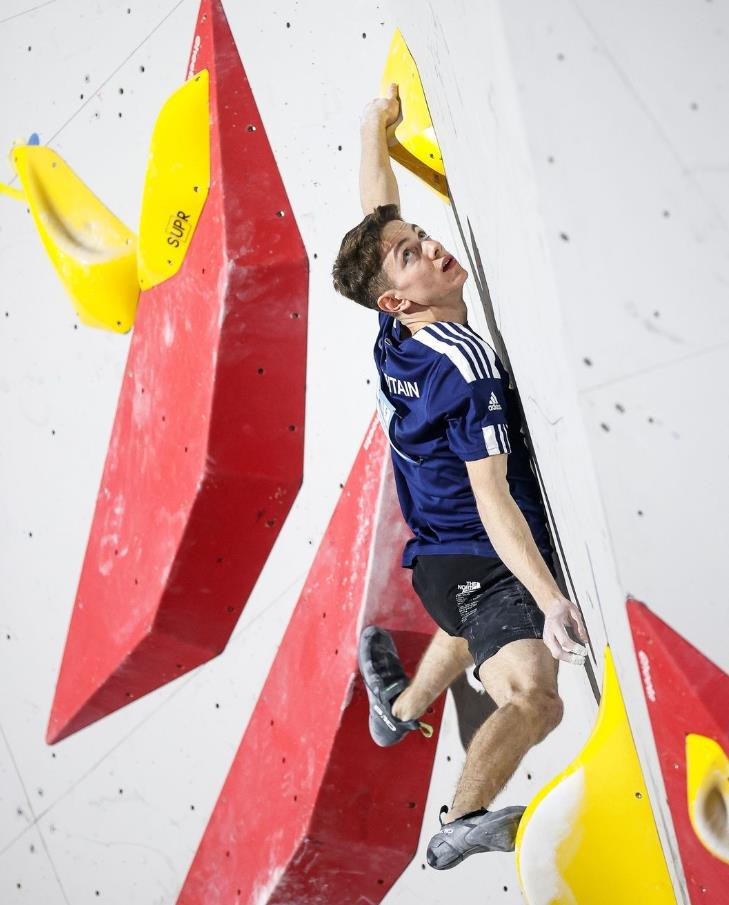
Climber got the low-down from Toby Roberts on how the event went from his perspective and how he sees the rest of what is a very busy year ahead unfolding.
Great result to finish 8th in your second ever WC Boulder event – you must be very happy with that and feeling very psyched at the way your first WC Boulder season is going?
Thank you. Yes – I’m definitely happy with the result in Seoul and the way the season has started.
I wasn’t disappointed with how I climbed in Hachioji, but I was disappointed not to make semi-finals so it was great to have another opportunity just a week later. Now the season is underway I’m just really psyched for the next comp in Salt Lake before getting into the European World Cup events and working towards the World Championships in August.
It’s been a long hard winter, so it’s great to have had such a positive start to the season and hopefully I can build on it.
Did you change your approach at all for the Seoul comp?
I didn’t really change my approach – I was essentially just trying to execute on the boulders that were in front of me. I got three tops and five zones in both the Hachioji and Seoul qualifiers, just in Seoul that was a better result.
It’s hard to explain or know what experience is – but it definitely helps to have some! I managed to improve from my first lead World Cup in Briancon to my second lead World Cup at Ratho, and now I’ve managed to improve from my first Boulder World Cup in Hachioji to my second in Seoul.
A lot of times a boulder will be unlocked with a very subtle movement or micro-beta such as standing on a foot hold in a particular way. I wouldn’t say there is one thing that makes a difference – it’s more instinctively approaching a boulder and relying on your experience and training to kick in.
Do you watch videos once the competition is over to see where you might do things differently if you face similar moves again?
Yes. In Hachioji I was running short of time on a paddle dyno boulder I needed to top to make semi-finals. After analysing the videos I realised my sequence was to hit the hold first with my right hand before matching the hold with my left. However on my last attempt I actually hit the hold with both hands at the same time and that made a big difference.
In Seoul I had a similar experience with a dyno and after lots of attempts I managed to stick the move and that made a big difference.
You’ve got three weeks before the next WC Boulder event in Salt Lake City in May. What have you taken from the first two events and what will you be concentrating on before the SLC events?
I feel physically in really good shape. I will definitely be training to maintain where I’m at but I feel like I’ve got a really good base.
Three weeks isn’t that long as we only just got home after 16 days away. That means the 1st week will be about some recovery and getting a good routine back quickly.
For the 2nd week I’ve now got various sessions planned. For example we’re hoping to recreate the 2 slabs from Hachioji and Seoul to try a few different methods and see what I can learn – even things like trying a stiffer shoe and I’d like to experiment with dropping my heel a lot more.
When you only have five minutes on a boulder that is then immediately stripped you don’t necessarily learn everything you wanted. So week two is probably working on some technical things.
Week three will be spent in Salt Lake City getting ready for the comp. I’m currently on Asia time trying to get back to UK time, and by the comp I need to be on US time!
Salt Lake City is also where the US training centre is and it will be my first time there, so I’m looking forward to a few days training there.
After SLC there’s another short break and then the final three WC Boulder events. What are your priorities going forward and what’s your game plan to handle all that is coming up?
The priorities this season were about first making sure I qualify for the OQS (Olympic Qualifying Series) and then focus on the World Championships in August where direct qualification for the Olympics is possible.
There is only two weeks between Salt Lake City and Prague – and with the time difference again it doesn’t leave that much time. Three Boulder World Cups in three weeks that then goes straight into lead season is a busy schedule.
Attending all three would be very difficult to then do any lead training, but the plan was always to assess where things are at after Salt Lake City.
What’s your take on podiums in the current WC Boulder series? Do you think it’s realistic to get a WC Boulder podium this year?
I don’t really focus on podiums, I focus on having the best possible preparation and then climbing as well as I can when I get the opportunities.
I definitely feel like I’m capable of a WC Boulder podium – but will have to wait and see how things go.
The Innsbruck event in June has both Boulder and Lead so yourself and the rest of the ‘Combined’ athletes won’t have much time to transition into Lead whilst the Boulder series is still running. How are you preparing for the start of lead?
It’s hard to train for two disciplines – however it’s possible to have a plan that works for both; although obviously you’ll peak slightly differently for each discipline.
At the moment the focus is boulder, but I also feel I have good base lead shape. My training plan started in October last year and I’ve put a lot of work in to lead already – so I’m hoping my lead shape comes together really quickly.
I’m not quite sure how Innsbruck will go, but as it’s the closest test to the World Championships in August it will be really useful to have a Boulder and a Lead World Cup so close together.
Fitness is acquired over years and the higher your base, the quicker things come back – or at least that’s definitely what I’m hoping.
Can we talk about the Lead events to finish. Having podiumed three times last year in a variety of Lead events, do you think you’ll be able to build on that in your first full season in senior Lead?
Last year I podiumed at the European Youth Lead Championships and a senior European Lead Cup, as well as a Lead World Cup.
This year I may not do any youth events and may only compete in World Cups – so the profile of events is totally different.
I already feel I’m making progress after just 2 Boulder World Cups this season and I feel I’m a better climber than last year. It would be nice if being a better climber translated directly to medals and hopefully that’s the case. I’ll certainly be trying hard.
Watch the Semi/Final video below…

